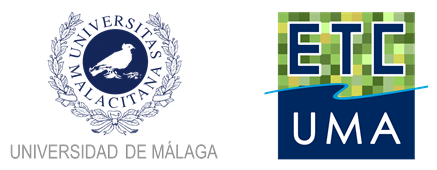European topic centre - university of malaga
Know more about us and meet the team
The European Topic Centre for Spatial Analysis and Synthesis (ETC-UMA) is an international research centre based at the University of Malaga (Spain) since 2010 engaged in the development of environmental knowledge to support evidence-based policy and decision-making. Researchers at ETC-UMA are part of the core team of a network of European Topic Centres supporting the European Environment Agency (EEA) in the implementation of various thematic components of its regional strategy and multi-annual workplans.
Besides supporting EEA in its mandate, the ETC-UMA team is involved in several international, European, regional and local projects. To mention some, the ETC-UMA is leading since 2016 the Mediterranean Biodiversity Protection community, a network of around 300 institutions in the Mediterranean working to ensure tools and approaches to reduce pressures on biodiversity in the region. Within the projects SWOS (H2020), Interplace (ESPON) on land-sea interfaces and CopHub.AC (H2020) of the Copernicus programme, ETC-UMA has been a key partner. The team has been engaged by the United Nations Economic and Social Commission for Western Asia (UNESCWA) to build the capacity of countries in the development of indicators to assess their Sustainable Development Goals (SDGs). At present, ETC-UMA is part of a consortium supporting the King Abdullah University of Science and Technology (KAUST) in developing a regional assessment of cumulative pressures and impacts in the Red Sea and Arabian Gulf.
The ETC-UMA team has expertise in regional data integration, harmonisation and sharing, generation of environmental indicators and the development of knowledge-based tools to help resource managers and decision-makers better understand and acknowledge how they depend and impact upon ecosystems. The ETC-UMA growing team is currently made of 10 professionals specialised in ecosystems and services assessments of marine and terrestrial environments, with wetlands, and forest and woodlands as two major working areas. The ETC-UMA staff profiles scientists, ecological modellers, geographers, GIS and remote sensing professionals, socio-economists, and IT programmers.
As a team, the objective of ETC-UMA is to identify and expose the causes of ecosystem changes based on science to influence policy and practices. To this end, ETC-UMA’s work focuses on mapping environmental and anthropogenic pressures and their impacts on biodiversity, raising awareness on the value of ecosystem services, and evaluating the implications of management choices for terrestrial, coastal and marine ecosystems with a special attention to Land-Sea interface questions.
Do you want to collaborate with us? Check out our job offers and Internship Programme




